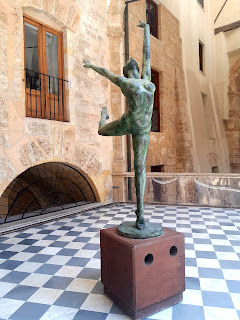Via dei Scopari
Via dei Scopari is legendary in Milazzo, scopare being the verb to have sex, though the street name comes from scopo, which means broom - and Scopari therefore means broom-maker. Apparently teenagers make it their aim to pass this way at least once for their romantic encounters … there is no evidence of this today as I walk the stroller down Broom-maker street. It is one of the oldest streets in the town, running parallel to the fishering port in the Vacarella area, and is an odd jumble of old and new: low town-houses next to ruins, abandoned weed-ridden lots next to four storey 1960s apartment blocks. A couple of buildings are nothing more than the façade with vacant windows revealing long grass and wooden beams hanging dejectedly. One has the stone gargoyles but no balcony, another has the rusty balcony railings, but no bottom to the balcony. A potted nespola plant bearing the small yellow plum-like fruits shows that there is life in the ground floor house below one such derelict house-front. The radio can be heard through the battered salt-worn wooden shutters. But there is a bit of spring-cleaning going on in the street: white lace curtains waver on washing lines in the breeze from second-floor apartments; plastic bottles full of water protect a mint plant from cats; a little blue jug, a tourist trinket from the Aeolian islands, has been placed on the windowsill of a toilet window; on the corner, a ragged plot has been carefully gardened and turned into a herb garden. Opposite, set into the loose stone wall there are colourful mosaics telling of the life of San Francesco di Paola, who founded the church just above in the twelfth century. Little objects of beauty in a dirty old town heaving and sighing under the weight of its history. A scrawny cat arches its back as it scrounges over a stinking, overflowing rubbish tip. Other grey cats don’t take their yellow eyes off me until I’ve passed. Neither does the old lady stepping out in black on the broken cobbles. Protecting their territory from the straniera.
We come out on the port to find the fishermen working together to tidy a clearing around a palm tree and fix up old stone sinks where people used to wash their clothes. They have a whole workline in operation – some pushing wheelbarrows, others collecting stones, others raking the mud, others with buckets. Rare to see Sicilians working together in such harmony and with such industry … There is no one else about, although it is 4.30pm. Most shops don’t open in the afternoon until 5pm; some open at 3.30pm or 4pm, but customers don’t risk going out since no one is clear about the commercial hours. Even if l’edicola, the newsagent, for example, usually opens at 4pm, if the owner had a late lunch or simply doesn’t feel like it, he might not open until 4.30pm. Just another of the grey areas in Sicily.
We come out on the port to find the fishermen working together to tidy a clearing around a palm tree and fix up old stone sinks where people used to wash their clothes. They have a whole workline in operation – some pushing wheelbarrows, others collecting stones, others raking the mud, others with buckets. Rare to see Sicilians working together in such harmony and with such industry … There is no one else about, although it is 4.30pm. Most shops don’t open in the afternoon until 5pm; some open at 3.30pm or 4pm, but customers don’t risk going out since no one is clear about the commercial hours. Even if l’edicola, the newsagent, for example, usually opens at 4pm, if the owner had a late lunch or simply doesn’t feel like it, he might not open until 4.30pm. Just another of the grey areas in Sicily.



Comments
Post a Comment